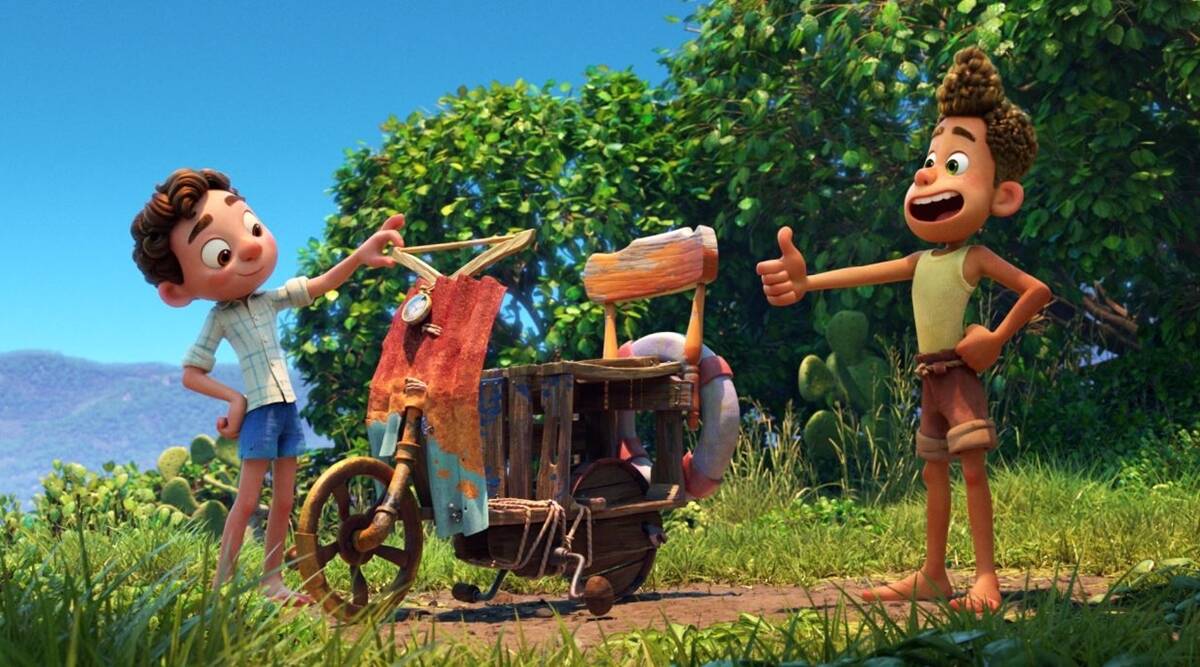What follows is a precisely observed jaunt of kid logic that is some of 2021’s most charming filmmaking. Alberto makes his own way, staying on an uninhabited island off the coast and free to construct the world as he sees it. Naïve Luca can only lap up whatever knowledge Alberto gives him about how the surface world works. This goes as elemental as the particulars of walking, a skill that Alberto can’t describe how to do but simply knows, to the existence of stars, which are fish because what else could they be? Casarosa’s script, co-written by Jesse Andrews and Simon Stephenson, has none of the modern sarcasm or irony in these sequences and lives purely in the world that Alberto has created and Luca is thrilled to inhabit, such that the most visceral feeling in the film is Luca knowing that he needs to get back home but experiences a magnetic pull to stay for a few more minutes. That allure is communicated with Miyazaki-esque patience, such that a sequence can lack for drama and simply be about the joy of spending time with a kindred spirit.
When hopelessly honest Luca blurts out his actions to his parents and they threated to send him to deeper parts of the ocean with an uncle, Luca and Alberto escape by hiding in Portorosso. The film does lose some of its charm here by diluting the core cast with new allies and antagonists, but Luca has charm to spare. The first glimpses of Portorosso are of a particularly appreciated variety, where dozens of stories are happening all at once. The one that Luca focuses on is the annual Portorosso Cup, an athletic/pasta-eating competition that the hated town punk Ercole (Saviero Raimondo) always wins. Luca and Alberto, obsessed with Vespas and desperate to earn enough money to buy one and explore the world, join up with local girl Giulia (Emma Berman) to win the Cup. The boys stay with Giulia and her gruff fisherman father Massimo (Marco Barricelli), where Luca is delighted to flip through Giulia’s textbooks on space and history and everything he can get his hands on. The further opening up of his world threatens his relationship with Alberto as much as it threatened his relationship with his parents, and the film careens toward a predictable if effective finale.
The best Pixar films succeed by wedding the sheer emotional tonnage that the studio regularly produces with bigger ideas. Luca doesn’t reach the studio’s highest pinnacles because it is so connected to specific childhood feelings and doesn’t leave room for much else, but that connection is as potent as the studio has ever produced. The film has been read as an LGBT youth allegory, and while that is readily apparent, the core is male friendship before it gets infected with all the impurities of masculinity and the dark corners of adolescence. Tremblay already trod this ground in Good Boys, a by turns earnest and vulgar comedy about a friendship that’s in its last stages of innocence, and Grazer did the same, to lesser effect, in It. Luca and Alberto are in the first stages, and its beautiful to behold. They’re effortlessly affectionate with each other, a symbiotic union of companionship and a remedy to each other’s loneliness. Luca’s thirst for knowledge and capacity for awe double down on the assets of childhood and make the viewer want to hop in a time machine, not to buy Amazon stock or stop 9/11 but to ride bikes down a dangerously steep hill with friends or return to a point where one hadn’t seen Back to the Future or Tommy Boy yet. That ability to freely find joy everywhere is something that wanes with age, and works like Luca remind the viewer how big life seemed when that muscle was working in overdrive.
As enchanting and transporting as Luca is, it’s also tremendously funny. Something as simple as Alberto walking, which he does with his elbows bent in front of him at right angles, is always good for a laugh. Whether his natural confidence bred a confident stride or Alberto saw someone walking like that and copied them is an open question, but a detail as small as that one breeding more than a passing glance is indicative of how considered the film is. Even obvious jokes based on the boys’ obliviousness to manners work. Why shouldn’t Alberto flick a booger when there’s one in his nose? The aforementioned kid enthusiasm, where every rusty Vespa is the greatest machine ever created and every bowl of pasta is the best tasting thing ever made, is sold by Tremblay’s and Grazer’s earnest performances and the imaginative animation. Rudolph’s Daniela, paired with Luca’s father Lorenzo (Jim Gaffigan), are a source of hilarious menace once they too get to Portorosso in search of their son. Not knowing what his human form looks like, their tactic is to chuck every kid in the ocean.
Pixar’s best entry since Coco might’ve been discounted by its studio and banished to a streaming-only release, but it’s a singular treat even on home screens. I knew I would love this film from the second a mid-century Italian pop song plays over the opening credits. Casarosa’s impeccable sense of place and his commitment to the inner lives of Luca and Alberto provide the viewer more than cheap nostalgia of the kind that Disney increasingly traffics in. Luca plugs into the fundamental pleasures of childhood instead of the disposable/cultural ones and therefore achieves a timeless and universal value. It’s a small story about the biggest of emotions. A-

 RSS Feed
RSS Feed